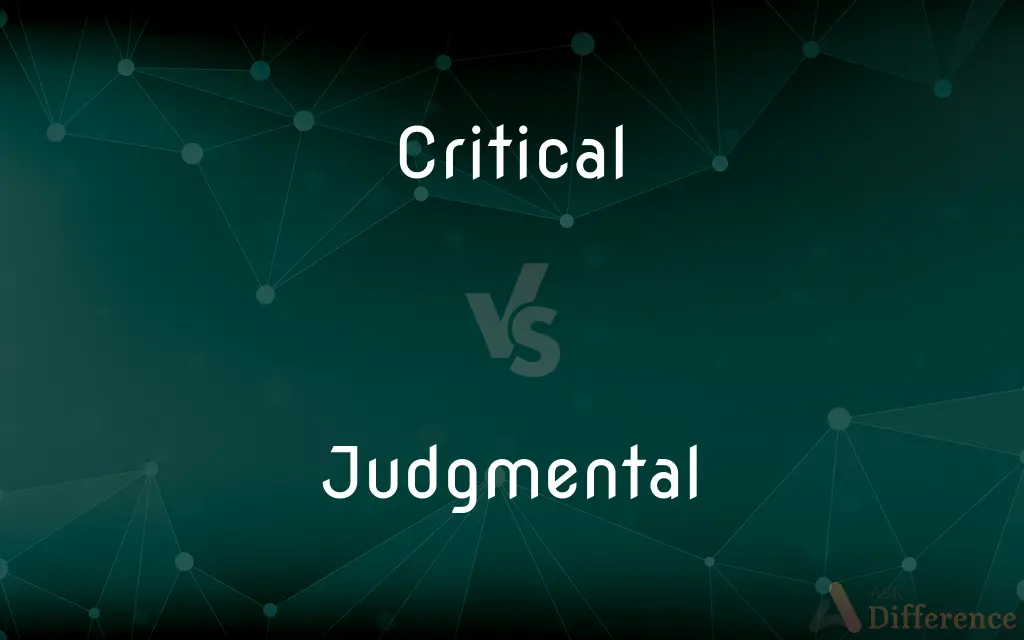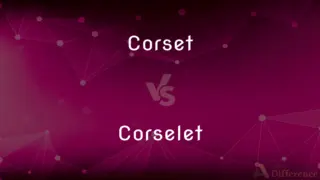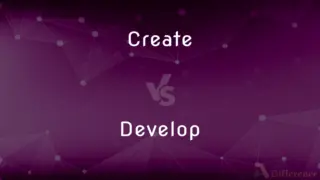Critical vs. Judgmental — What's the Difference?
By Tayyaba Rehman & Urooj Arif — Updated on April 21, 2024
Critical thinking involves analyzing and evaluating an issue to form a judgment, while being judgmental often implies a negative or overly critical perspective without thorough analysis.

Difference Between Critical and Judgmental
Table of Contents
ADVERTISEMENT
Key Differences
Critical thinking is an essential cognitive process where individuals analyze information and evidence to form reasoned judgments. On the other hand, being judgmental involves making quick assessments that are often based on personal biases or insufficient information.
When someone is critical, they engage in a detailed examination and evaluation, aiming to understand and make decisions based on logical reasoning. Whereas, a judgmental person may rely more on personal opinions and emotions, which can lead to unfair conclusions.
Critical thinkers are often seen as constructive, as they provide insights that are intended to improve or solve problems. In contrast, judgmental attitudes are frequently viewed as negative, focusing on faults or criticisms without offering solutions.
The approach of a critical thinker is systematic and based on factual data; they ask questions to gather more information and clarify understanding. Meanwhile, a judgmental person might not seek additional information, often sticking to their initial impression or preconceived notions.
A critical mindset is open to new ideas and perspectives, willing to update beliefs based on new evidence. On the other hand, judgmental attitudes often resist change and can be inflexible, dismissing information that contradicts their views.
ADVERTISEMENT
Comparison Chart
Basis of Evaluation
Logical reasoning and evidence
Personal biases and opinions
Purpose
To understand, improve, or solve
To assess, often negatively
Nature of Feedback
Constructive and solution-oriented
Often negative without solutions
Information Seeking
Systematic and thorough
Limited, based on initial views
Openness to New Ideas
High, adapts to new evidence
Low, resistant to changing views
Compare with Definitions
Critical
Pertaining to analysis and judgment.
Her critical skills were evident in how she dissected the argument.
Judgmental
Involving the use or exercise of judgment.
This job requires judgmental skills to assess clients' needs.
Critical
Crucial or pivotal.
The scientist played a critical role in the discovery.
Judgmental
Inclined to make judgments, especially moral or personal ones.
Her judgmental tone alienated her colleagues.
Critical
Involving an analysis of the merits and faults.
The review was critical in highlighting the film’s strengths and weaknesses.
Judgmental
Denoting an attitude in which judgments about other people's conduct are made.
His judgmental approach often overlooks people’s true intentions.
Critical
Expressing adverse or disapproving comments or judgments.
He was critical of the project's lack of originality.
Judgmental
Expressing critical opinions.
He’s known for his judgmental comments about everyone's work.
Critical
Requiring careful evaluation and judgment.
Critical thinking is essential in scientific research.
Judgmental
Quick to judge others' character or choices.
Avoid being judgmental in sensitive situations.
Critical
Expressing adverse or disapproving comments or judgements
I was very critical of the previous regime
Judgmental
Of, relating to, or dependent on judgment
A judgmental error.
Critical
Expressing or involving an analysis of the merits and faults of a work of literature, music, or art
She never won the critical acclaim she sought
Judgmental
Inclined to make judgments, especially moral or personal ones
A marriage counselor who tries not to be judgmental.
Critical
(of a situation or problem) having the potential to become disastrous; at a point of crisis
The floodwaters had not receded and the situation was still critical
Judgmental
Of or relating to judgment.
Critical
Relating to or denoting a point of transition from one state to another
If the density is less than a certain critical value the gravitational attraction will be too weak to halt the expansion
Judgmental
Inclined to rashly pass judgment, critical.
Critical
(of a nuclear reactor or fuel) maintaining a self-sustaining chain reaction
The reactor is due to go critical in October
Judgmental
Depending on judgment; as, a judgmental error.
Critical
Judging severely and finding fault
A writer who is very critical of the government's foreign policy.
Judgmental
Inclined to make moral judgements about the behavior of people; - contrasted with an inclination not to judge the moral qualities of others. Opposite of nonjudgmental.
Critical
Relating to or characterized by criticism; reflecting careful analysis and judgment
A critical appreciation of the filmmaker's work.
Judgmental
Depending on judgment;
A judgmental error
I think that she is too judgmental to be a good therapist
Critical
Of, relating to, or characteristic of critics
A play that received great critical acclaim.
Critical
Including scholarly commentary and interpretation
A critical edition of Poe's stories.
Critical
Forming or having the nature of a turning point; crucial or decisive
A critical point in the campaign.
Critical
(Medicine) Being or relating to a grave physical condition, especially of a patient.
Critical
Being in or verging on a state of crisis or emergency
A critical shortage of food.
Critical
Extremely important or essential
A critical element of the plan.
A second income that is critical to the family's well-being.
Critical
(Mathematics) Of or relating to a point at which a curve has a horizontal tangent line, as at a maximum or minimum.
Critical
Chemistry & Physics Of or relating to the value of a measurement, such as temperature, at which an abrupt change in a quality, property, or state occurs
A critical temperature of water is 100°C, its boiling point at standard atmospheric pressure.
Critical
(Physics) Capable of sustaining a nuclear chain reaction
The reactor has gone critical.
Critical
Inclined to find fault or criticize.
A good teacher is fair but critical.
Critical
Pertaining to, or indicating, a crisis or turning point.
This is a critical moment.
Critical
Extremely important.
It's critical that you deliver this on time.
Critical
Relating to criticism or careful analysis, such as literary or film criticism.
The movie was a critical success, but bombed at the box-office.
Critical
(medicine) Of a patient condition involving unstable vital signs and a prognosis that predicts the condition could worsen; or, a patient condition that requires urgent treatment in an intensive care or critical care medical facility.
The patient's condition is critical.
Critical
Likely to go out of control if disturbed, that is, opposite of stable.
The political situation was so critical that the government declared the state of siege.
Critical
(physics) Of the point (in temperature, reagent concentration etc.) where a nuclear or chemical reaction becomes self-sustaining.
The reaction was about to become critical.
Critical
(physics) Of a temperature that is equal to the temperature of the critical point of a substance, i.e. the temperature above which the substance cannot be liquefied.
Critical
A critical value, factor, etc.
Critical
In breakdancing, a kind of airflare move in which the dancer hops from one hand to the other.
Critical
Qualified to criticise, or pass judgment upon, literary or artistic productions.
It is submitted to the judgment of more critical ears to direct and determine what is graceful and what is not.
Critical
Pertaining to criticism or the critic's art; of the nature of a criticism; accurate; as, critical knowledge; a critical dissertation.
Critical
Inclined to make nice distinctions, or to exercise careful judgment and selection; exact; nicely judicious.
Virgil was so critical in the rites of religion, that he would never have brought in such prayers as these, if they had not been agreeable to the Roman customs.
Critical
Inclined to criticise or find fault; fastidious; captious; censorious; exacting.
O gentle lady, do not put me to 't,For I am nothing, if not critical.
Critical
Characterized by thoroughness and a reference to principles, as becomes a critic; as, a critical analysis of a subject.
Critical
Pertaining to, or indicating, a crisis, turning point, or specially important juncture; important as regards consequences; hence, of doubtful issue; attended with risk; dangerous; as, the critical stage of a fever; a critical situation.
Our circumstances are indeed critical.
The small moment, the exact point, the critical minute, on which every good work so much depends.
Critical
Marked by a tendency to find and call attention to errors and flaws;
A critical attitude
Critical
At or of a point at which a property or phenomenon suffers an abrupt change especially having enough mass to sustain a chain reaction;
A critical temperature of water is 100 degrees C--its boiling point at standard atmospheric pressure
Critical mass
Go critical
Critical
Characterized by careful evaluation and judgment;
A critical reading
A critical dissertation
A critical analysis of Melville's writings
Critical
Urgently needed; absolutely necessary;
A critical element of the plan
Critical medical supplies
Vital for a healthy society
Of vital interest
Critical
Forming or having the nature of a turning point or crisis;
A critical point in the campaign
The critical test
Critical
Being in or verging on a state of crisis or emergency;
A critical shortage of food
A critical illness
An illness at the critical stage
Critical
Of or involving or characteristic of critics or criticism;
Critical acclaim
Common Curiosities
What is the main difference between being critical and judgmental?
Being critical involves reasoned judgment based on analysis, whereas being judgmental often implies quick, biased opinions without thorough understanding.
Can a critical person be judgmental?
While a critical thinker focuses on fairness and evidence, they can sometimes appear judgmental if their feedback is harsh or overly direct.
Why is critical thinking important?
Critical thinking allows for better decision-making and problem-solving by evaluating information and arguments logically.
Can judgmental behavior be constructive?
Judgmental behavior is rarely seen as constructive, as it often lacks the depth and positivity of critical analysis.
What impact does a judgmental attitude have on relationships?
A judgmental attitude can harm relationships by creating feelings of resentment, misunderstanding, and emotional distance.
How can critical thinking improve one's life?
By applying critical thinking, individuals can make more informed, rational decisions that lead to better outcomes in various aspects of life.
How can one avoid being judgmental?
To avoid being judgmental, it's important to seek full understanding, consider multiple perspectives, and withhold quick judgment.
Is it negative to be critical?
Being critical is not inherently negative; it depends on the intent and manner in which the criticism is delivered.
How does society view critical versus judgmental people?
Society generally values critical thinkers for their objective analysis and problem-solving skills, while judgmental people may be viewed less favorably due to their perceived negativity.
What skills are necessary for critical thinking?
Skills important for critical thinking include analysis, reasoning, and problem-solving.
Share Your Discovery

Previous Comparison
Corset vs. Corselet
Next Comparison
Create vs. DevelopAuthor Spotlight
Written by
Tayyaba RehmanTayyaba Rehman is a distinguished writer, currently serving as a primary contributor to askdifference.com. As a researcher in semantics and etymology, Tayyaba's passion for the complexity of languages and their distinctions has found a perfect home on the platform. Tayyaba delves into the intricacies of language, distinguishing between commonly confused words and phrases, thereby providing clarity for readers worldwide.
Co-written by
Urooj ArifUrooj is a skilled content writer at Ask Difference, known for her exceptional ability to simplify complex topics into engaging and informative content. With a passion for research and a flair for clear, concise writing, she consistently delivers articles that resonate with our diverse audience.














































